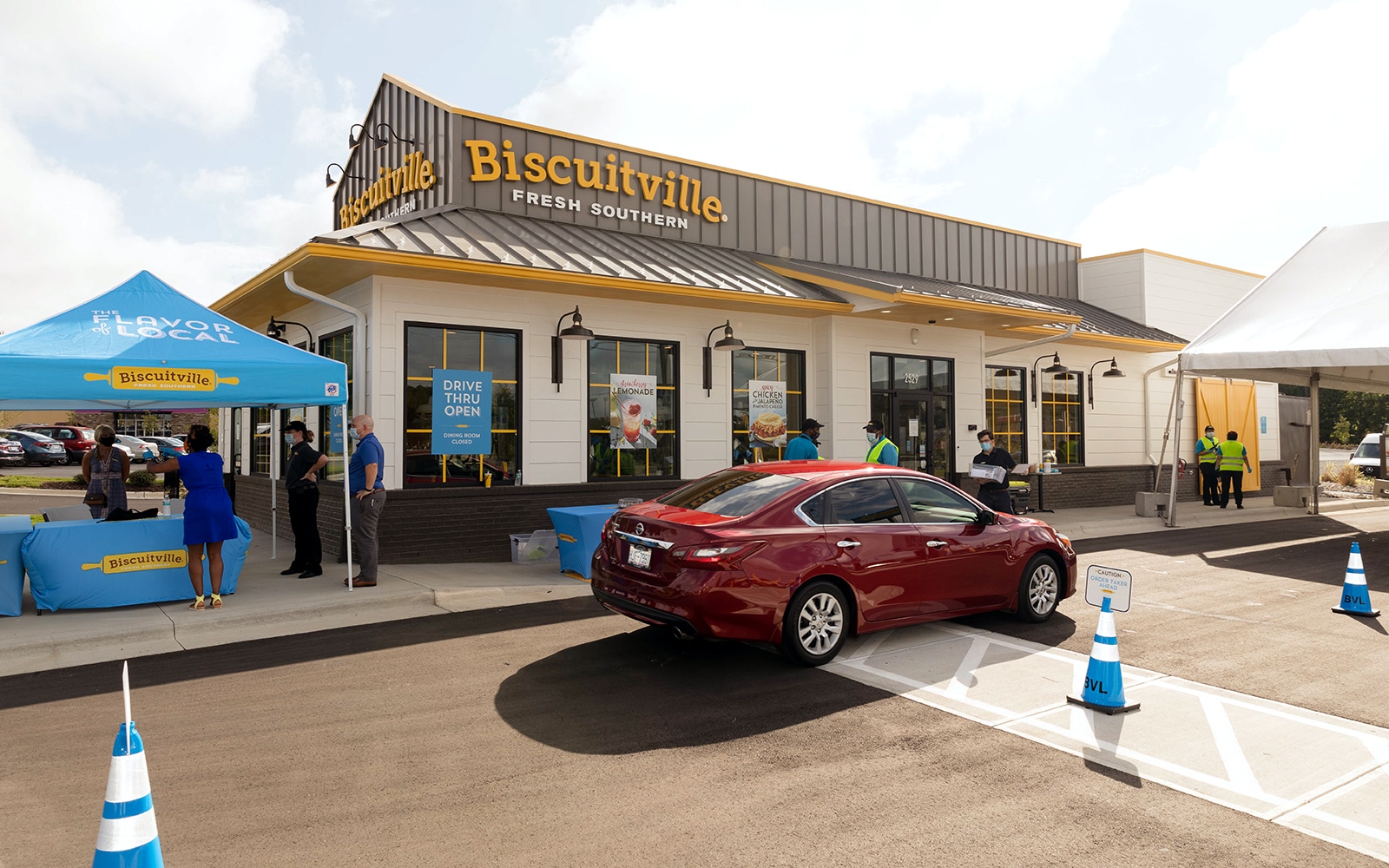|
Getting your Trinity Audio player ready...
|
Blake Jennings has worked at every level of Biscuitville, a Greensboro, North Carolina-based family business that got its start under his grandfather’s leadership more than fifty years ago. After his father took the reins, it continued to expand, and Jennings began working there in high school. He gained early insight into its operations through various roles in the company’s restaurants, warehouses, and corporate office.
“I got to see what a fully integrated, self-managed business looks like,” Jennings says. “One thing about Biscuitville compared to others is we do everything ourselves. We have our own distribution facility with more than fifteen trucks, and we service our own stores. On the real estate side we self-develop and own our properties. We are really selective in our use of third parties.”
Today, as Biscuitville’s chief development officer, Jennings oversees all aspects of real estate and growth for the company. After college, however, he struck out on his own, parting ways with the family business to chart his own path. Realizing he had a passion for real estate, he wanted to get more hands-on experience in the industry.
“One thing about Biscuitville compared to others is we do everything ourselves. . . . We are really selective in our use of third parties.”
Blake Jennings
At first it wasn’t easy. When Jennings entered the job market, real estate markets were still reeling from the 2008 recession, and he struggled to find work. Finally, however, he got the opportunity to work in Washington, DC, at First Potomac.
“They owned a lot of government buildings in the DC area [in] Richmond and Maryland, and I got to learn the back-end financial workings of real estate, working with banks and publicly traded equity partners buying and selling assets,” he says.
While he gained valuable experience, Jennings was set on pursuing a career in real estate development. He’d just taken the GMAT and was considering getting his MBA when he had lunch with someone who worked for the largest developer in Raleigh, North Carolina. Jennings was offered a job there a week later.
He went on to help build student housing and high-rise buildings in the city, managing deals from inception to completion. That experience, he says, helped give him the tools he’d need to be successful in his current role. There are differences, Jennings notes: in his previous role, he was working on one or two projects at a time over a duration of three years.

“At Biscuitville, we’re running fifteen deals at once and the duration is twelve months,” he explains. “However, you still run into the same issues with civil engineers and banks, dealing with permitting at the county and coordinating with all the partners involved with transactions.”
It’s a fast pace, and the expertise Jennings gained in the development sector before returning to Biscuitville in 2018 has allowed him to spearhead initiatives that will help the business evolve.
One of those initiatives involves implementing the company’s first drive-through-only restaurant, a move that other quick-service restaurants have also made in response to consumer preferences during the COVID-19 pandemic. Orders at drive-throughs grew by 20 percent between February 2020 and February 2022, according to the NPD Group. And even in the aftermath of pandemic restrictions, drive-through sales made up 75 percent of all fast-food sales.
For Jennings, the drive-through-only prototype is part of a larger effort to deemphasize the development of large dine-in restaurant models. In fact, he projects dine-in traffic will only make up about 20 percent of its business in the future. After conducting studies and running tests, he and his team worked to fine-tune dining rooms to enhance customer experience and modify existing prototypes to save costs and optimize labor. As they eye expansion, they’re also using data to figure out the best locations to expand to.
“My site selection process has evolved to be both art and science. Using customer and economic data, site visits, and a healthy dose of personal experience, I’m able to identify the best locations for our brand to thrive,” Jennings says.
When Jennings first returned to Biscuitville, it had only built two new units in the past decade. Today, it has 75 locations, with plans to expand its reach throughout the southeast and eventually compete on a national level.
“I play a high-level strategy role and support my team members to execute it. I really depend on my team.”
Blake Jennings
Amidst this expansion, Jennings makes sure to support his team, which is comprised of a real estate manager, project managers, and a construction manager. “I play a high-level strategy role and support my team members to execute it,” he says. “I really depend on my team. It’s about quality of life for me. I don’t want to have to do other people’s jobs and I don’t want them to have to do that either.”
Biscuitville has always taken the quality of life of its employees seriously. In 1982, it started closing restaurants at 2 p.m., a philosophy the business calls “life after two.” “That work/life balance is very important, especially in competitive hiring environments,” Jennings says. “It provides a fantastic employee base who provide an exceptional level of service at our restaurants.”
In the future, Jennings would like to see the brand “grow as large as it can be safely.” The “safely” part is important because Biscuitville is a centralized company and manages all aspects of the business rather than depending on franchisees.
“I’d love to see us hit the hundred-location mark in the next three years,” he says. We’re still a pretty small brand, only operating in three states [North Carolina, Virginia and South Carolina], so I look forward to having more people get to know us.”


